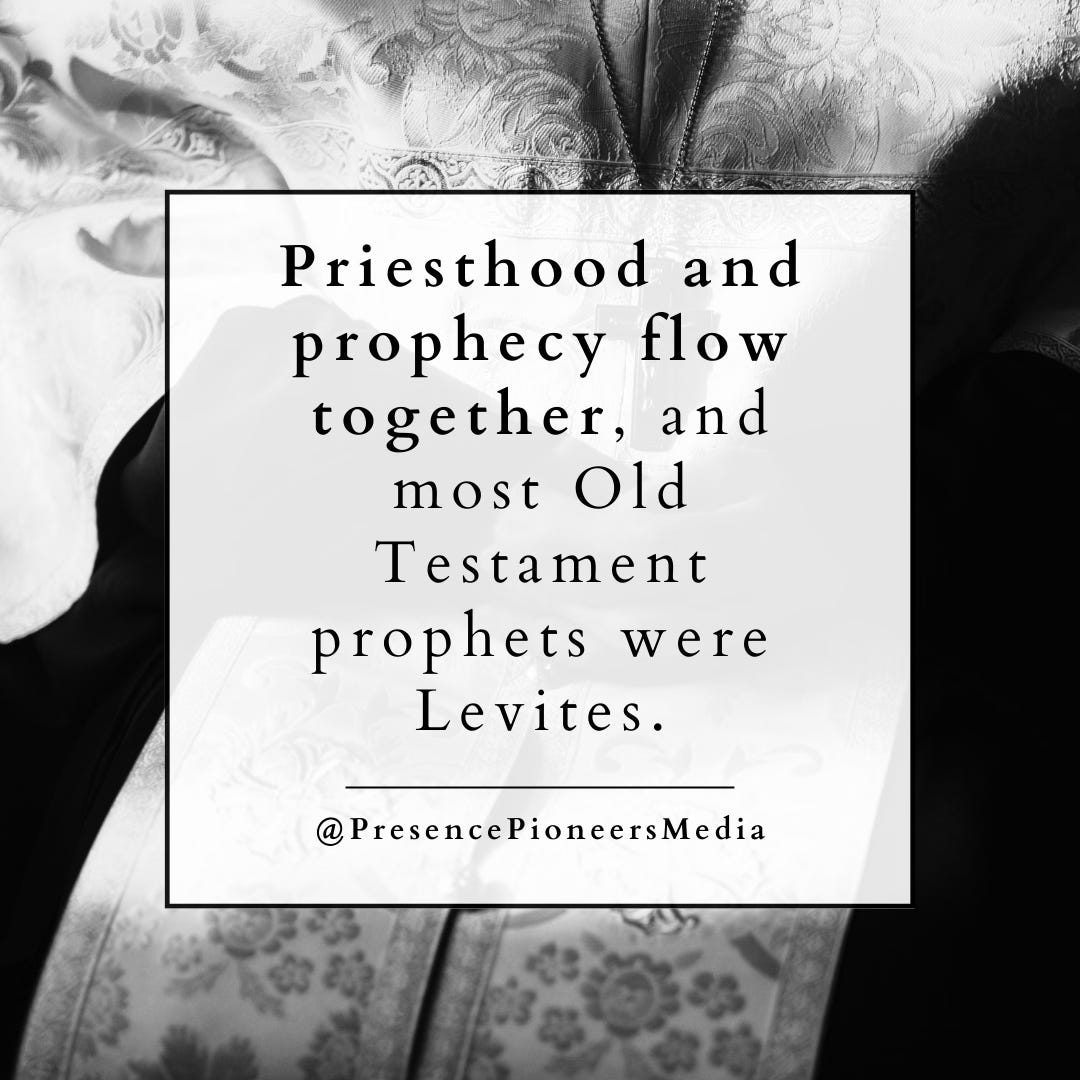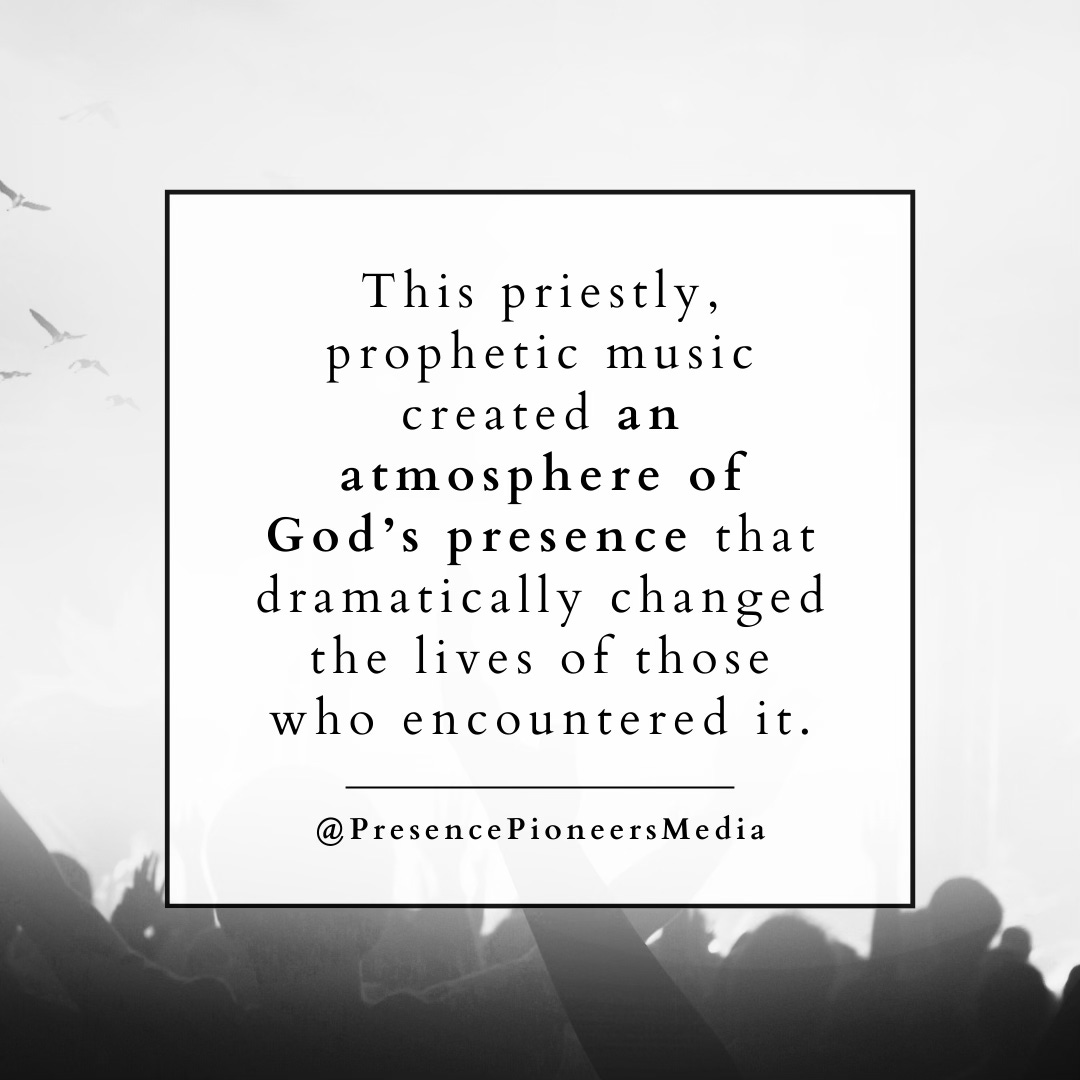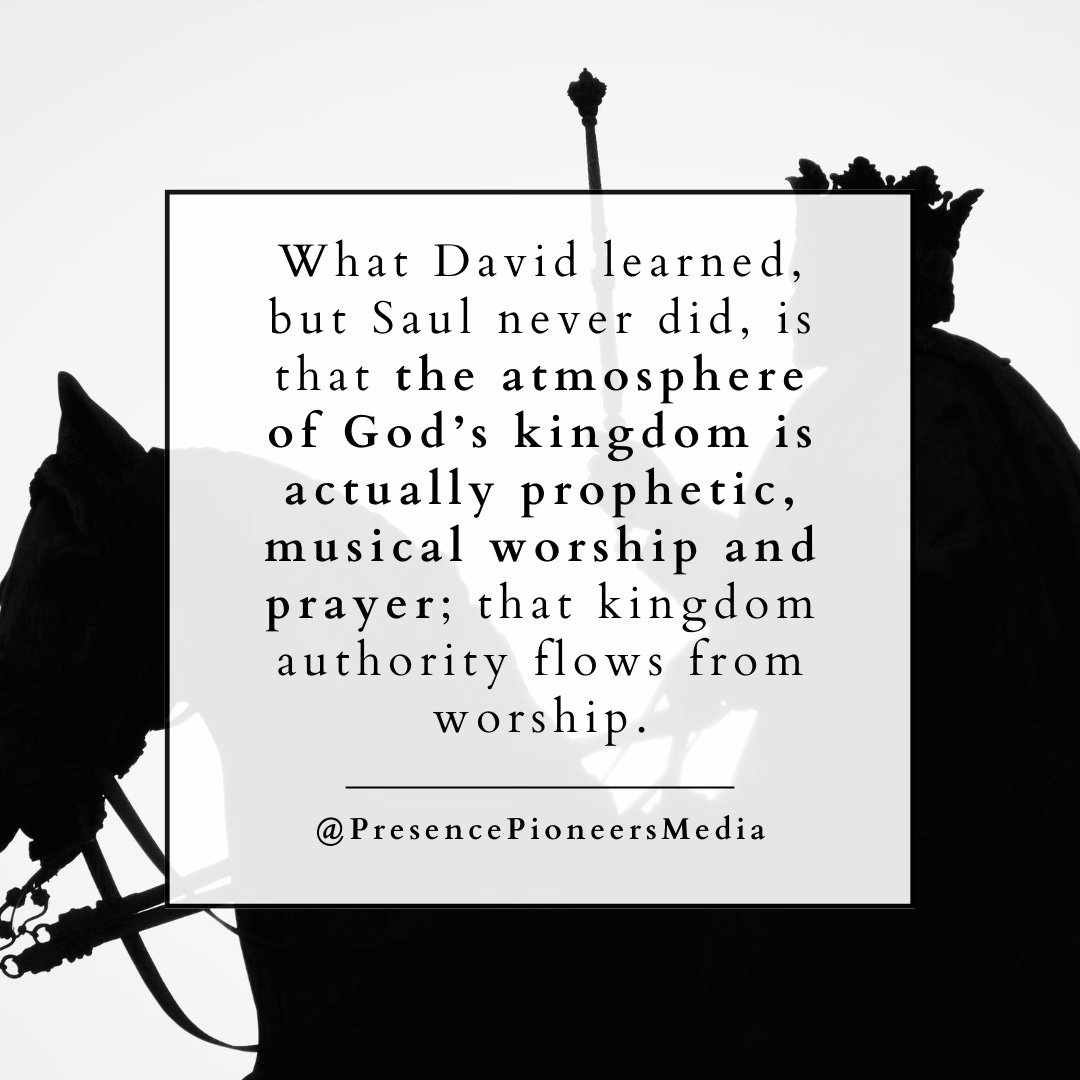The Supernatural Power of Prophetic Worship Music
King David discovered the power of praise through a series of supernatural experiences with Samuel and Saul in his formative years.
King David discovered the power of praise through a series of supernatural experiences with Samuel and Saul in his formative years. These encounters provided foundational revelation upon which David would ultimately build his tabernacle.
Let’s take a glimpse back into David’s origin story, beginning with the prophet Samuel. Samuel emerged as a prophet to Israel after a season where God was not speaking at all (I Samuel 3:1, 19-21), and he would end up anointing Saul and David as Israel’s first two kings.
Samuel was a forerunner who laid the foundations for the tabernacle of David by training up prophetic musicians, who would later serve as the staff for David’s day-and-night worship tent. He did this by establishing “schools” of prophetic musicians among the Levites in the years preceding David’s reign (I Samuel 10:5-13, 19:18-24). Some believe that Samuel’s team of prophetic musicians may have been the very first “band” of musicians in ancient history.
In the first of these stories, the prophetic musicians were described as coming down from a high place (I Samuel 10:5). Most commentators agree that the worshipers were descending from a hill where they would have been offering priestly sacrifices and burnt offerings to God. Samuel was a Levite who had learned to minister to God as a priest from his youth (I Samuel 3:1), and he was teaching these minstrels to be priests and prophets with their music. Priesthood and prophecy flow together, and most Old Testament prophets were Levites. This makes sense, because a priest is someone who ministers to God and serves as a mediator between God and man. Levites like Samuel would spend time in God’s presence through worship, prayer, and study of the Torah (God’s word). Their relationship with God enabled them to prophesy — to hear God’s voice and to speak to others on God’s behalf.
Samuel acted as a spiritual father to these Levitical musicians, laying a foundation of discipleship and training that would be vital to keep the tabernacle of David sustained. He imparted this calling to minister to the Lord and prophesy to the next generation. He willingly spent his ministry raising up other young prophets, which allowed him to leave a legacy that lasted beyond his lifetime. This pattern would continue in the tabernacle of David, with some of Samuel’s children serving as key musicians in David’s tent (see I Chronicles 25:6). Both Saul and David’s encounters with these prophetic minstrels would be life changing.
Saul’s Failed Leadership
Saul was the very first king chosen by Israel. Before that time, Yahweh Himself had acted as the King of His people. God granted His people’s request for a new king, and Samuel anointed Saul as the first human king of Israel. After he was anointed, God’s first instruction to King Saul was to visit the prophetic worship school (I Samuel 10:5-6). What an interesting first assignment as the first king of Israel! Why would God tell Samuel to instruct Saul to go down to the prophetic musicians as his first lesson in how to be a king? Why would prophetic music be at the top of the agenda? It seems that Saul needed additional skill sets in preparation for his new leadership role.
When Saul encountered these prophetic minstrels, the Scriptures say “the spirit of God rushed upon Him” (I Samuel 10:10). He was “turned into another man” (I Samuel 10:6), and God “gave him another heart” (I Samuel 10:9). This priestly, prophetic music created an atmosphere of God’s presence that dramatically changed the lives of those who encountered it. Samuel and his teams understood the reality that God is enthroned on praises, and God was letting the new king of Israel experience this power firsthand.
In his initial encounter with the prophetic musicians, I believe God was immediately trying to teach Saul how His kingdom works. There is something about musical, prophetic worship that is central to the way God’s kingdom flows and functions. There is something about the priesthood and prophecy that is related to God’s government. Saul would have to learn about worship if he wanted to be a leader in God’s kingdom.
Unfortunately, he did not learn his lesson. Saul was not a successful king. Over the course of his reign, he constantly refused to walk in full obedience with a heart of worship towards God. He became proud and self-reliant. After one successful battle, Saul became impatient waiting for Samuel. He took the priesthood into His own hands and offered burnt offerings in contradiction to God’s word. Samuel arrived with a rebuke from God that Saul’s kingly line would not continue. Instead, Samuel said, God would seek “a man after his own heart” (I Samuel 13:14). That man was David.
Another string of mistakes would culminate with Saul’s final act of disobedience. Rather than annihilating the Amalekites as God instructed, he kept some of their animals for himself. When Samuel arrived to confront Saul in his disobedience, Saul lied and said that they were going to be sacrificed as burnt offerings to God. Samuel rebuked him and told him that “to obey is better than to sacrifice” (1 Samuel 15:22). Saul tried to cover up his inward selfishness with external religious activity (sacrifice), but God wanted nothing to do with it. God wanted Saul’s heart (obedience). Yet Saul was a self-seeking king who wanted to rule in his own way rather than serve as a conduit through which God could lead Israel. At that point, God rejected Saul and promised the end of his reign.
David’s Anointed as King
Immediately following this episode, Samuel was led by God to anoint a new king of Israel. David was the man after God’s heart who had been chosen to replace Saul. As soon as David was anointed king, Scripture says “the Spirit of the Lord rushed upon David from that day forward.” (I Samuel 16:14). How would this lingering presence of the Holy Spirit empower David? In the very next verse God sent a distressing spirit to torment King Saul. David was invited to come play his harp to soothe Saul and bring relief to his oppression.
And so it was, whenever the spirit from God was upon Saul, that David would take a harp and play it with his hand. Then Saul would become refreshed and well, and the distressing spirit would depart from him. I Samuel 16:23
When David played his harp, God’s presence and power would manifest to relieve Saul from the demonic torment. What Saul had experienced with Samuel’s prophetic worship schools, he was experiencing again through David’s music — the reality that praise brings God’s presence, and God’s presence changes everything.
It is remarkable that after both Saul and David were anointed as kings, the very first thing that happened was a demonstration of the power of prophetic worship! Saul was anointed and immediately encountered Samuel’s worship schools and was “turned into another man.” David was anointed king and immediately played his harp and saw the demons flee from the king. Again, it raises the question: why would the Spirit of God want to teach the kings of Israel about the power of musical worship as their first leadership lessons?
What David learned, but Saul never did, is that the atmosphere of God’s kingdom is actually prophetic, musical worship and prayer; that kingdom authority flows from worship. Saul was still technically king, but David suddenly had more authority. Even with all the power and resources of his position, Saul could not deliver himself from the demonic torment of the spirits that harassed him. But one shepherd boy who was surrendered to God, who had learned to move God’s heart with his songs, could play his harp and set the king free. Saul had earthly position, but David had heavenly authority.
Essentially, God was trying to help Saul and David both realize that they could never rightfully rule and reign over Israel. Yahweh Himself was the one who could truly walk in the authority needed to lead the nation. However, if they would learn that God is “enthroned in praise” (Psalm 22:3), then they could allow God to have his rightful place in the kingdom. Because of Saul’s pride and selfishness, he never wanted to submit to the leadership of the Lord. His heart was hardened by arrogance and rebellion, so he refused to worship God. Instead, Saul was committed to enthroning himself as king. Yet David’s heart was tender towards God. He surrendered his heart and leadership to the leadership of the Lord. He recognized that prophetic worship opened the door to God’s presence, bringing the kingdom of God with it. David was learning that, in God’s kingdom, proper priestly activity was vital to ensuring proper kingly activity. I believe God tried to teach Saul this from the very start, but he never received it.
We see this same principle in heaven. The twenty-four elders that circle the throne room “cast down their crowns” before God Himself (Revelation 4:10). They give up their authority and enthrone the only One who is worthy of it all. You will either willingly cast down your crown like David or be forced to cast down your crown like Saul. For those with a humble heart like David, like those twenty-four elders, they receive access to the very throne of God. They have true authority because they have humility. In the next scene in heaven, those same elders are not wearing crowns anymore, but are holding harps and bowls of incense, which represent the prayers of God’s people (Revelation 5:8). The kings have become priests. This was also the path that David took.
Saul wanted to be a king, but David desired to be a priest. Saul ended up being neither and David ended up doing both. There is a way authority works in God's kingdom, and Saul missed it. David got it. God's government flows from worship. Authority comes from intimacy. David had the heart of a worshiper. He wanted what God wanted. And if we want to see God’s kingdom come on earth as in heaven (Matthew 6:10), we must avoid doing things Saul's way and miss it all.







